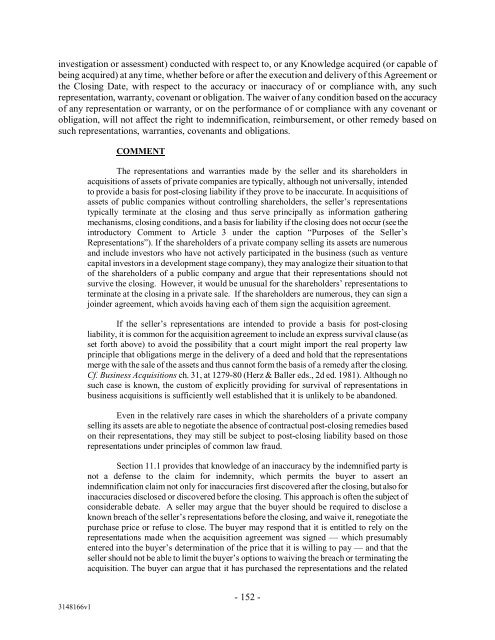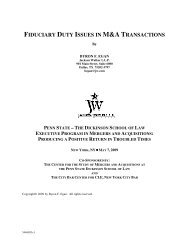asset acquisitions - Jackson Walker LLP
asset acquisitions - Jackson Walker LLP
asset acquisitions - Jackson Walker LLP
You also want an ePaper? Increase the reach of your titles
YUMPU automatically turns print PDFs into web optimized ePapers that Google loves.
investigation or assessment) conducted with respect to, or any Knowledge acquired (or capable ofbeing acquired) at any time, whether before or after the execution and delivery of this Agreement orthe Closing Date, with respect to the accuracy or inaccuracy of or compliance with, any suchrepresentation, warranty, covenant or obligation. The waiver of any condition based on the accuracyof any representation or warranty, or on the performance of or compliance with any covenant orobligation, will not affect the right to indemnification, reimbursement, or other remedy based onsuch representations, warranties, covenants and obligations.COMMENTThe representations and warranties made by the seller and its shareholders in<strong>acquisitions</strong> of <strong>asset</strong>s of private companies are typically, although not universally, intendedto provide a basis for post-closing liability if they prove to be inaccurate. In <strong>acquisitions</strong> of<strong>asset</strong>s of public companies without controlling shareholders, the seller’s representationstypically terminate at the closing and thus serve principally as information gatheringmechanisms, closing conditions, and a basis for liability if the closing does not occur (see theintroductory Comment to Article 3 under the caption “Purposes of the Seller’sRepresentations”). If the shareholders of a private company selling its <strong>asset</strong>s are numerousand include investors who have not actively participated in the business (such as venturecapital investors in a development stage company), they may analogize their situation to thatof the shareholders of a public company and argue that their representations should notsurvive the closing. However, it would be unusual for the shareholders’ representations toterminate at the closing in a private sale. If the shareholders are numerous, they can sign ajoinder agreement, which avoids having each of them sign the acquisition agreement.If the seller’s representations are intended to provide a basis for post-closingliability, it is common for the acquisition agreement to include an express survival clause (<strong>asset</strong> forth above) to avoid the possibility that a court might import the real property lawprinciple that obligations merge in the delivery of a deed and hold that the representationsmerge with the sale of the <strong>asset</strong>s and thus cannot form the basis of a remedy after the closing.Cf. Business Acquisitions ch. 31, at 1279-80 (Herz & Baller eds., 2d ed. 1981). Although nosuch case is known, the custom of explicitly providing for survival of representations inbusiness <strong>acquisitions</strong> is sufficiently well established that it is unlikely to be abandoned.Even in the relatively rare cases in which the shareholders of a private companyselling its <strong>asset</strong>s are able to negotiate the absence of contractual post-closing remedies basedon their representations, they may still be subject to post-closing liability based on thoserepresentations under principles of common law fraud.Section 11.1 provides that knowledge of an inaccuracy by the indemnified party isnot a defense to the claim for indemnity, which permits the buyer to assert anindemnification claim not only for inaccuracies first discovered after the closing, but also forinaccuracies disclosed or discovered before the closing. This approach is often the subject ofconsiderable debate. A seller may argue that the buyer should be required to disclose aknown breach of the seller’s representations before the closing, and waive it, renegotiate thepurchase price or refuse to close. The buyer may respond that it is entitled to rely on therepresentations made when the acquisition agreement was signed — which presumablyentered into the buyer’s determination of the price that it is willing to pay — and that theseller should not be able to limit the buyer’s options to waiving the breach or terminating theacquisition. The buyer can argue that it has purchased the representations and the related3148166v1- 152 -
















